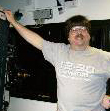For Evans and everyone else.July 11, 2002 Talk about it E-mail story Print
COLUMN ONE
Filming Without the Film
High-definition digital cameras, feared by some directors, could end the careers of those unable to make the transition.
Audio
Times writer P.J. Huffstutter discusses digital movie making, courtesy KPCC and "All Things Considered" of National Public Radio.
July 10, 2002 (RealAudio)
Graphics
Times Headlines
One Man's Quixotic Quest for Telecom Glory
Filming Without the Film
Disney Channel Scores With Repackaged Hits
Bush Spurs Debate Over Loans to Execs
Nasdaq, S&P Plummet to 5-Year Lows
more >
By P.J. HUFFSTUTTER and JON HEALEY, TIMES STAFF WRITERS
NICASIO, Calif. -- Oliver Stone stared in disbelief. Here he was, sitting in a velvet seat in George Lucas' private screening room, listening to the "Star Wars" director foretell the death of film.
To Stone, director of such films as "Platoon" and "JFK," Lucas' vision of digital movie making sounded like blasphemy. Around him, other A-list directors--including Steven Spielberg, Francis Ford Coppola and Robert Zemeckis--fidgeted as Lucas challenged a century of tradition, warning his colleagues to embrace the future or be left behind.
Lucas' blunt message stands at the center of a schism in Hollywood over the fate of film in the film business. New high-definition video cameras and digital editing equipment challenge the longtime supremacy of film. They are cheaper and more flexible. But they also frighten directors and cinematographers who understand every nuance of film. A creative misstep can tarnish a career, so many of those established in the film industry blanch at the thought of showing their inexperience with the latest technology. A colossal mistake, seen by millions of fans, might reveal that they are passe storytellers--easily replaced with younger, cheaper and more tech-savvy rivals.
"Film is what we do. It's what we use," Stone sniped at Lucas. "You'll be known as the man who killed cinema."
Lucas merely rolled his eyes as Stone waxed about the poetry of celluloid and the coldness of pixels.
Finally, according to those who were there, Lucas interrupted.
"Just watch."
Raising a hand, Lucas cued his demonstration and told his audience what they would see: identical clips--each stored on different formats--from the animated movie "Monsters, Inc."
One was completely electronic--compiled by a computer, stored on digital tape and shown through a digital projector. In footage looking less like a motion picture and more like an open window onto a real world, the monsters gabbed in crisp clarity and rich tones.
Next came a traditional film reel that spent four weeks in a mall theater. With each showing, heat from the projector and dust in the air faded and degraded the reel. The difference was jarring. Radically out of focus, the film reel cast an image on the screen that jiggled and popped, as if an earthquake were rocking the projector.
Lights came up as the demonstration ended. No one spoke for several seconds.
Debate within the industry is not nearly so quiet.
For directors such as Lucas, the choice is obvious. Breaking new ground for major motion pictures, his "Star Wars: Episode II Attack of the Clones" was shot entirely with high-definition digital cameras, edited with digital equipment and, for a few dozen theaters, distributed and projected digitally.
Testing the Technology
Spotting the change, a growing number of filmmakers have been testing the digital waters. From students and independent filmmakers capturing their low-budget works on digital video to established directors such as Michael Mann testing high-definition cameras in "Ali," they are curious about the new tools and fearful of being left behind.
But after nearly a century of using film, much of Hollywood's old guard is reluctant to shift gears, a reticence that speaks to a powerful culture of fear among some of the industry's most elite directors.
"Film is rather like the magic lantern. There's a sense of mystery, because you don't know what's going into the magic black-box camera until you send the film to the lab," said cinematographer Roger Deakins, director of photography for Ron Howard's film "A Beautiful Mind."
"With digital, it's all very businesslike," Deakins said. "We're not businessmen. We're artists and magicians."
Despite significant advances in the art and science of film since the first roll of flexible celluloid was produced in 1889, the basic process remains the same: Chemicals layered on the surface of the film react when they are exposed to light, changing into hues that match the light's wavelength.
Digital cameras, which began to appear in the mid-1990s, use powerful computer chips that convert light into electronic pulses, which they then translate into data and store on videotape.
With the first cameras, the images were unusually crisp and realistic but no match for the smooth lines and range of colors delivered by 35-millimeter film. Those differences stemmed partly from the cameras' chips, which couldn't capture as much information as film, and partly from the technology used to shrink and store the data.
Sony Corp., Panasonic and other manufacturers developed high-definition digital cameras in the late 1990s that could deliver far more detail and a wider range of color. This summer, Thomson Grass Valley is bringing out a new line of cameras that can capture almost five times as much detail and twice the range of color as previous high-definition models, said Jeff Rosica, vice president of marketing.
Frugality also is pushing studios and filmmakers to consider digital tools. Advocates insist that the technology cuts costs, partly by eliminating key parts of the movie-making process. For example, there's the time-honored--and time-consuming--ritual of handling "dailies."
When a day of shooting wraps, the crew sends the footage to a processing lab. After the film negatives have been developed, the reel is returned to the set. The director and often the crew gather inside a screening room. Then they cross their fingers.
Shoot-and-Pray Method
What they want to see up on the screen--and what the camera actually captured--aren't always the same. Perhaps the spotlights burned too brightly and washed out the image. Maybe the director didn't spot the catering truck parked in the background. If someone loaded the film into the camera incorrectly, the reel might be blank.
"With film, you get 60% of what you want," said director Robert Rodriguez. "In film, cinematography is the art of guessing."
Each mistake, each reshoot, eats up time and money. The shoot-and-pray cycle is nearly erased with digital cameras, because the images can be viewed instantly.
By replacing film in the cameras with videotape and speeding the flow of work, Lucas saved at least $3 million in production costs on "Attack of the Clones," producer Rick McCallum said. That's a small fraction of the movie's $100-million budget, but "when you're financing it yourself, and you're financing the marketing, anything you can do to be more cost-efficient helps," he said.
The need to cut production costs led News Corp.-owned 20th Century Fox Television and the executive team behind the series "The Education of Max Bickford" to take the digital plunge. The tactic worked, said producer Rod Halcomb, who estimated that the crew saved as much as $25,000 per episode in post-production and filming costs.
Regardless of the savings and technical innovation, no tool could save "Max Bickford": CBS dropped the series after its first year.
"Digital technology is the director's friend, just in principle. Because of it, directors can come closer to realizing what's in their minds," said director Ron Howard. "I'm open to it. I'm just not open to using it until all the bugs are worked out."
A Digital Weak Spot
Managing the problems of a digital set remains a daunting task, since such "bugs" can eat up much of the savings that the digital process promises.
Amid the ashy dust of the Mojave Desert, just up a worn road from the boarded-up Oasis Motel, "Confidential Report 001" director Chris Coppola sits and waits impatiently for the crew to set up the cameras.
"This was supposed to be a $600,000 independent film," said Coppola, nephew of Francis Ford Coppola. "Now, we're way, way over budget."
The culprit, the younger Coppola said, is the high-definition gear. Two of the Sony cameras died in the last month as dust and heat made the computer electronics useless. The cameras' computer chips, which are sensitive to distance, can require more time to set up a shot than traditional gear. Then there was the mysterious blue pixel.
"We played back the footage and there it is, in random spots: a single blue pixel," said director of photography Andrew Giannetta. "No one knows why. Even Sony told us, 'We don't know what's wrong. If you figure it out, and figure out how to fix it, tell us.' "
One of the most difficult artistic hurdles is manipulating the look of the footage. Film blurs colors together around their edges, but digital cameras achieve a clarity that strikes some as harsh.
Unexpected Clarity
For filmmakers such as Rodriguez, this sense of clarity fits into his stylized action films. While recently shooting actor Johnny Depp in "Once Upon a Time in Mexico," the director relied solely on digital cameras.
The tools picked up every detail, and uncovered the unexpected.
"I always thought Johnny Depp's eyes were black," Rodriguez said. "On the playback monitor, I realized they are really a light caramel color. If the eyes are the window of the soul, what ... are we doing shooting film and blurring that window?"
Reality, however, doesn't fit into the vision of every filmmaker. For some, manipulating what the eye sees is the goal.
While working on the "Max Bickford" series, director of photography Michael Mayers tried pairing various digital cameras with the lenses and filters he often used when shooting with traditional film.
Again and again, the equipment from these two worlds failed to work together and fell short of giving him the look he wanted. The images appeared far too sharp for the softer, cinematic feel of the script, Mayers said.
Ultimately, he found his solution at the grocery store: Saran Wrap. The plastic sheets, when attached to a camera lens, gave the footage a subtle diffusion he wanted.
"Not everyone is comfortable taking on this type of challenge," said Eric Brevig, an Academy Award-winning visual-effects supervisor at Lucas' special effects shop, Industrial Light & Magic. "A lot of people are testing out high-definition cameras in secret. They're terrified of making mistakes."
They have reason to be, as the technological evolution in movies has left behind a landscape littered with casualties. When sound was added to film, thousands of musicians lost their jobs because theaters no longer employed live orchestras to accompany silent movies. A generation of actors failed to make the transition, and directors weren't spared.
Onetime Hollywood giants such as Rex Ingram, who directed "The Four Horsemen of the Apocalypse," and Fred Niblo, who directed "Ben-Hur" and Douglas Fairbanks Sr. in "The Mark of Zorro," quickly disappeared as the new tools became part of daily life.
Digital cameras herald a similar and potentially traumatic shift. Directors and cinematographers face a terrifying question: What happens if you lack the skills to continue telling stories in a world in which the narrative tools have fundamentally changed?
"You become afraid," said cinematographer Emmanuel Lubezki. "I'd spent 20 years learning how to use a film camera. Now, I had to pick up something new, and there were all these other people who were far better at using this new technology than I was."
While working as director of photography on "Ali," Lubezki spent time scouting locations and photographing them in the middle of the night using a digital video camera.
The result "was so different and interesting," he said, that director Michael Mann asked him to re- create the surreal feel of the footage with a film camera. After weeks of experimentation, the cinematographer realized he couldn't do it. The only alternative was to use a high-definition digital camera--something he had never used.
"I took classes. I made mistakes," Lubezki said. "I was afraid. I didn't know if I could make it work. But I did, and it was worth it. This is different from film. Not better or worse but different. You can't let fear of the unknown prevent you from taking that chance."
Oliver Stone agrees. Several days after seeing the digital camera demonstration at Lucas' ranch, Stone called an executive at ILM.
The firm had been responsible for figuring out how to make the connection between the digital camera and the post-production effects work on the latest "Star Wars" movie and has close ties to several camera manufacturers.
"Listen, I know you're going to shoot me for this," Stone said to the executive. "But I'm starting work on a new project. Do you know where I can get ahold of some high-def cameras?"

 Home
Home
 Products
Products
 Store
Store
 Forum
Forum
 Warehouse
Warehouse
 Contact Us
Contact Us




 Printer-friendly view of this topic
Printer-friendly view of this topic





















